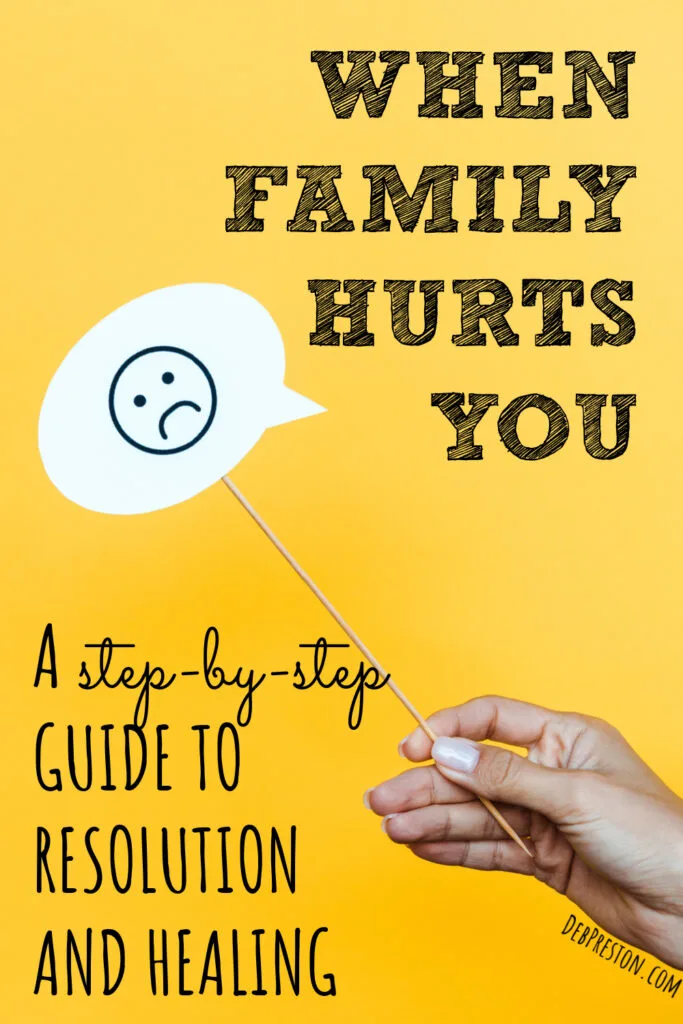A friend of mine’s father struggled with his mental health for the last decade of his life. It sank him deep into depression and anxiety, as you might expect, but it also made him angry and defensive toward others.
He called my friend terrible names. He accused her of not caring about him while she slaved away day and night to meet his needs. I watched her own physical and mental health decline as she constantly put him first, then cried every day at the awful way he treated her.
Yes, he loved her. Yes, he was suffering from debilitating mental health issues.
But still…she was so deeply hurt. What are you supposed to do when family hurts you?
Why Family Hurting You Is Especially Painful
Family hurts just sting a little deeper, don’t they? Why does it hurt so much when family hurts you? It’s due to a combination of factors.
Media and cultural beliefs both teach us that family should be there for us no matter what, that they’re held to a higher standard than a friend. Unfortunately, family members are also usually the ones who know us best, both the good and the bad. That means they still remember that thing that happened 25 years ago and aren’t afraid to rub it in our faces under the right conditions.
Additionally, family members are more dependent on one another for financial, physical, and emotional support, adding an additional strain to our relationships with them. And when things go south, we might still be dependent on them…or can at least count on seeing them for every holiday and birthday party from now to eternity.
All of these factors make hurtful situations with them much more stressful and complicated. So what do you do when family hurts you? I’m so glad you asked!
Acknowledge the hurt. Name each one.
You can’t begin to deal with or heal from family hurts until you acknowledge their existence. Stop making excuses for others’ behavior and take a few minutes to simply focus on its impact on you. Name each hurt out loud.
Acknowledge your feelings.
Now it’s time to acknowledge how the family member’s words and actions you identified above make you feel.
The actions themselves are different from the emotions they trigger in others. An important part of understanding yourself and others is being able to consider and understand how others’ actions affect you.

Don’t allow those feelings to define you.
Don’t allow your emotional reaction become your truth. For example, someone causing you to feel insignificant or stupid does not mean that you are, in fact, insignificant or stupid.
A commonly used technique for manipulating or abusing others is to first make them feel silly or stupid. This is called gaslighting and is not only not okay, it’s a bold-faced lie.
Decide what you need.
Do you need to confront the person? (I would always recommend this step but understand it’s not always possible or productive.)
Or maybe you just need to lessen your time together? To distance yourself a bit? Have you reached the point where you need to cut them off altogether?
Don’t make this decision based on what you think others expect of you or what you feel is the kindest or most polite option. Decide what you need to live a healthy, mentally and emotionally sound life and do that thing.
Seek counseling.
As part of your decision-making process, I highly encourage seeking counseling with a therapist or spiritual leader. They can help to offer feedback from an outsider’s perspective (which is often incredibly validating) and equip you with some practical tools and guidelines to help you work through the situation.
Seek God.
If you’re a Christian, it’s important to pray through these types of conflicts and seek direction from the Word of God. It will not only encourage you but also help you to zoom out to see the big picture from an eternal perspective.
Prepare for the conversation.
Whether you want to confront your family member about their behavior or simply stop answering the phone, you need to collect your thoughts and be ready to discuss them kindly but firmly.
If you choose to talk to the offending family member, they’ll likely attempt to gaslight you, insisting you’re overreacting. This kind of response can cause you to quickly backtrack unless you’ve prepared for their rebuttal.
If you choose to simply cut them off, your other family members might insist you repair the relationship. Anticipating their objections and planning your response will help you to maintain control of the conversation and situation.
Set boundaries.
Now that you’ve prepared, it’s time to set those boundaries and stick to them. This is often the hardest part!
If you struggle with establishing and maintaining boundaries, be sure to check out Setting Boundaries | How to Stop Feeling Guilty and Resentful All the Time for some practical guidance!

Remember that boundaries aren’t personal.
It’s easy when family hurts you to feel stuck in a “me versus you” dynamic. But boundaries aren’t about spiting the other person for the sake of spite. They’re about recognizing what you have control over and what you don’t and drawing practical lines in the sand to protect your time, energy, and mental health.
Remind yourself of this if/when you begin to feel guilty for setting boundaries with family. Remind your other family members of this when they demand you not set boundaries with family.
Find compassion for them.
It’s important (for your sake!) during this process that you don’t become a hardened, inconsiderate person who cuts people off at their first offense. That kind of life leads to loneliness, isolation, and ultimately, depression. So take a moment to consider their past, their personal struggles, and their current situation.
For example, a family member might lash out at you due to stress from a failing marriage, a life-altering diagnosis, or a history of abusive relationships. While the cause doesn’t excuse the behavior, it can offer you a bit of insight and understanding.
Forgive them for your sake.
Oof, this one hurts! But holding onto unforgiveness doesn’t hurt the other person, it hurts you.
Be sure to check out How to Forgive Someone Who Isn’t Sorry | Letting Go For Good for some extra help in this area!
Accept what is.
While some people are capable of recognizing their hurtful actions and changing their ways, many others are not. If you’ve found a family member has a history of hurting you and has resisted your efforts to discuss and remedy the situation, they might just be the second type of person.
Rather than holding onto false hope, or the indignation of what you know they should do, choose to simply accept that this is unfortunately just the kind of person they are.
Examine your own heart.
Is it possible that your words or actions might have helped to either create or exacerbate the entire situation? Did these circumstances reveal anything about you, good or bad? Is there anything you could have done differently or better in this situation?
This step isn’t necessarily assuming you’re at fault but rather assuming that everyone has room to grow. How can you walk away from this situation better than when you started?
Move on.
When family hurts you, it’s easy to allow the entire situation to sink you for good. But it’s important for your own sake that you move on with your life.
The only person who should hold the power to make our break your life…is you. So after you’ve taken appropriate action to address your issues with your family, it’s time to make a plan to move forward.

And there you have it, what to do when family hurts you. From identifying the family hurts and your own feelings, to deciding on, setting, and maintaining appropriate boundaries, to moving forward, you can totally do this!
Do you have any other tips for dealing when family hurts you? Or maybe want to share your own story? Be sure to sound off in the comments!
FAQ
How can you deal with family members that disrespect you?
It depends on the type and level of disrespect.
I’ve had family members mildly disrespect me due to stereotypes engrained in them since childhood. (Old habits die hard!) In those instances, I’ve simply ignored their ignorance and allowed my example to prove them wrong.
If family members are involved in more blatant disrespect, you might wish to either confront them regarding their behavior, distance yourself from them, or cut ties with them altogether. (Check out this guide for help making hard decisions!)
How do you respond to a family member who has hurt you?
It’s important to express your hurt to them if you feel comfortable doing so. Many people aren’t aware that their words or actions have hurt others unless/until it’s brought to their attention.
Depending on the results of that conversation and the severity of the situation, you may choose to reconcile, distance yourself, or separate from your family member altogether.
How do you tell your family they are hurting you?
Approach the conversation focused not on the person’s actions themselves but rather on how their actions make you feel. This will help to lower the probability of your family member acting defensively.
Additionally, go into the conversation knowing what you want from it. What is your goal?
Are you looking for an apology? A change in your relationship’s status quo? Maybe you want to set some boundaries?
Focusing on your end goal will help to keep your conversation on track and make it more productive.
What to do when you feel hated by your family?
This is another situation that should spark a conversation with your family members. Explain that you feel hated by them (most family members would likely be shocked to know you felt so strongly) and ask if they do. They will either apologize and explain themselves or confirm your suspicions.
Whatever the outcome, and whatever road you choose to take based on that outcome, know that you are worthy of feeling loved and accepted by others. You are worthy of being treated with respect and maturity. If you find yourself being treated otherwise, it’s time to find yourself…somewhere else.
How do you forgive a family that hurt you?
Forgiveness is always difficult, especially when your pain was caused by someone who was supposed to love and support you. Walk through the steps in How to Forgive Someone Who Isn’t Sorry | Letting Go For Good to work through those difficult feelings and then let them go.
Is it OK to cut ties with family?
It is certainly okay to cut ties with family! Being related to someone doesn’t excuse abuse.
Be sure you understand the full impact of cutting ties with family before doing it though, since it’s much more complicated and has farther-reaching, longer-lasting effects than cutting ties with a friend.
What are signs you should cut off your family?
Clear signs you should cut off your family include physical, mental, and emotional abuse. If your life or health are in danger, it’s time to go (and contact the authorities, when appropriate).
Outside of those situations, it’s important to consider if they seem open to change, if spending time with them makes you feel better or worse about yourself, and if your relationship with them increases or decreases your quality of life.
What to do when family cuts you out of their life?
As someone who’s personally been cut out of the life of a family member, I suggest letting it be. While a complete cut is difficult at first, you might also find time away from them feels refreshing and even restorative.
You might attempt contact after giving it some time, if maintaining the relationship is important to you, but don’t push it! You’ll only cause unnecessary stress to yourself.
Andy Warhol once wisely said, “When people are ready to, they change. They never do it before then, and sometimes they die before they get around to it. You can’t make them change if they don’t want to, just like when they do want to, you can’t stop them.”
If you feel a void in their absence, consider deepening existing friendships, making new friends who feel like family, or even joining a church small group or local club to help fill the gap. Family Not Involved in Your Life? 8 Practical Ways to Thrive Anyway offers a fantastic starting place!
What is a toxic family?
The Merriam-Webster Dictionary defines “toxic” as “extremely harsh, malicious, or harmful.” A toxic family is one that is extremely harsh, malicious, or harmful to you and/or other family members.
Am I the problem in my family?
This is definitely a question worth asking! While some families might convince you that you’re the problem as a form of gaslighting, there might be some merit to their words.
As noted above, it’s important to take an honest self-evaluation. Consider your own words and actions and their impact on others. If you have a close friend or coworker, ask for their honest opinion of how they and others perceive you.

P.S. Could you use a little extra encouragement and perspective in this season of your life? Peace in the Valley is refreshingly honest, down-to-earth, and speaks to the heart of the matter – how can we reconcile our trials with our faith? You can check it out HERE.
Disclosure: While all opinions are our own, we are a participant in the Amazon Services LLC Associates Program and other affiliate advertising programs, designed to provide a means for us to earn fees by linking to Amazon.com and affiliated sites, at no additional cost to you.



